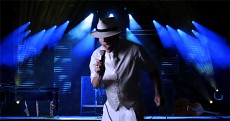|
|
| "Bloomin' Passion, helping yours inspire kids into happy adults" |
|
William Price King-Jazz
William Price King is an American jazz singer, crooner, and composer.
 |
explains to students his Love for Jazz!
Interview by Host Paul Cody with Canadian Professional Recording Artist David R Guitard
William's vocal mentors are two of the greatest giants in jazz, Nat King Cole and Mel Torme. King has a distinctive wide-ranging voice which displays a remarkable technical facility and emotional depth as seen in his Collaboration with Eric Sempe Tribute to Mel Torme and his many Jazz Videos
His interest in music began at an early age when he studied piano and clarinet in high school. At Morehouse College in Atlanta where he grew up, he studied classical music. After graduation he went off to Yale University where he earned a Masters degree in music. From there he journeyed to New York where he created a jazz trio ‘Au Naturel’ which performed in some of the hottest venues in Manhattan including gigs on Broadway and the famous ‘Rainbow Room.’ These gigs opened doors for performances in Montreal and a European tour.
"The Real Purpose of Jazz is to inspire kids to Love & Play Music" Paul Cody
Paul; William, what is jazz?
William; Jazz is an American musical art form which emerged at the beginning of the 20th century. It’s characteristics are improvisation, syncopation, and rhythm - “It don’t mean a thing if it ain’t got that swing.” Jazz is spontaneous in that band members have the opportunity to create their own interpretations within a given tune in response to what the other musicians are doing “at the moment.” This is called improvisation and it is one of the defining elements of jazz. It is a musical dialogue between band members without any preconceived notion of what the final result could be.
David; William, was Jazz your first genre that you began to love,, how did it become your genre of choice!?!'
William; Hello David. The first genre of music that I loved and related to was Classical music. I studied piano as a child and the clarinet as a teenager. In college I majored in classical music and became a singer, singing the classical repertoire. As an adult, after hearing Nat King Cole and Mel Tormé sing the great jazz standards, I was impressed by the freedom that they had in interpreting and imposing a new style to what they were singing, unlike the strict interpretations I was accustomed to in classical music. That freedom of musical expression was a turning point for me in making the switch from classical music to jazz.
Paul; What are the different styles of jazz?
William; The different types of jazz music are Rag Time, the Blues (out of which comes jazz blues, jazz funk, jazz fusion), Dixieland, Big Band, Bebop, Free Jazz, Afro Cuban jazz, Cool jazz, Latin jazz, and the list goes on as long as new jazz artists explore new territories.
Paul; Why is jazz often associated with the idea of freedom?
William; Jazz evolved as an interaction between individual musicians in a band wherein each one found freedom in the music, as one should find freedom in society. The history of jazz is filled with the desire for social transformation and an end to inequalities. This desire for freedom is manifested in the music through the use of improvisation – the ability for an artist to transform a song by imposing his own style. This search for freedom can be seen as the result of a lack of cultural and political freedom coming from the place where jazz was born. So, music was not just seen as what it was but also what it could become. Jazz helped open the door, thus providing freedom for self expression and identity.
Paul; Who are the new young and rising jazz musicians of today?
Willam; I have had the pleasure to discover some great new talent: singer Gregory Porter, bassist/cellist Esperanza Spalding, pianist Robert Glasper, singer Cécil McLorin Salvant, trumpeter Marquis Hill, singer Melody Gardot, guitarist Mary Halvorson, pianist Aaron Diehl, tenor saxophonist Tivon Pennicott, drummer Jamison Ross, singer Sachal Vasandani, and drummer Kendrick Scott. Check them out, they are great!
Paul; Who is the most famous jazz musician of all time?
William; Without a doubt it’s Louis Armstrong “Satchmo” from New Orleans.
Paul; I do not understand jazz? What can I do to understand and appreciate jazz?
William; Listen, listen, listen! Close your eyes and pay proper attention to the music. Listen to as many jazz records as you can. Go to concerts, talk with jazz musicians, read books. For those who do not understand jazz I think they should try to listen preferentially by listening to the melodies and then the improvisation, and listen to the different instruments and how musicians ad lib and respond to each other. There’s a lot to learn from listening.
Sponsored by the Albums,
|
|